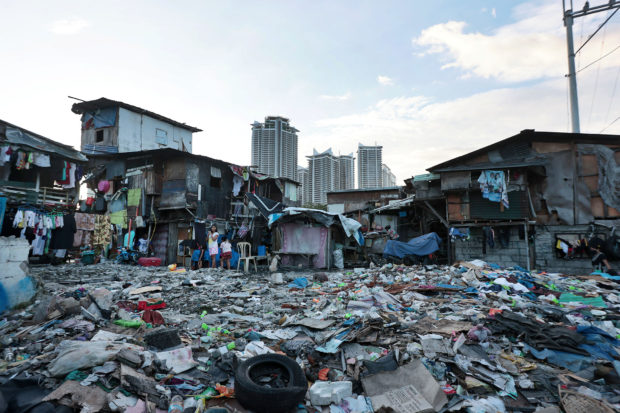
SLUM LIFE | Around the glitzy business districts of Metro Manila are poor neighborhoods, like this community in Makati City’s Guadalupe district, where families face the daily struggle of putting food on their tables. (Photo by GRIG C. MONTEGRANDE / Philippine Daily Inquirer)
MANILA, Philippines — The number of billionaires should be reduced by half by 2030 through higher taxes and other policies to make the world more equal, Oxfam said on Monday as political leaders, including President Ferdinandn Marcos Jr., CEOs, and global elites gathered at the ski resort town of Davos in Switzerland for the World Economic Forum (WEF).
In a report titled “Survival of the Richest,” the aid group noted that billionaires had doubled their wealth over the last 10 years, with the wealthiest 1 percent gaining 74 times more than the bottom 50 percent.
Since 2020, billionaire wealth has surged by $2.7 billion a day even as inflation outpaced the wages of at least 1.7 billion workers worldwide, Oxfam said. Food and energy companies, it observed in its report, had more than doubled their profits last year.
The aid group called for taxes at rates that progressively redistribute wealth and reduce extreme inequality. For starters, it said that “the world should aim to halve the wealth and number of billionaires between now and 2030, both by increasing taxes on the top 1 percent and by adopting other billionaire-busting policies.”
Such steps would bring billionaire wealth and numbers back to levels last seen in 2012. “The eventual aim should be to go further, and to abolish billionaires altogether, as part of a fairer, more rational distribution of the world’s wealth,” Oxfam said.
Based on estimates, an annual wealth tax of up to 5 percent on the world’s multimillionaires and billionaires could raise $1.7 trillion a year to fund shortfalls in public services — enough to raise two billion people out of poverty.
“Taxing the super-rich and big corporations is the door out of today’s overlapping crises,” said Gabriela Bucher, Oxfam International executive director. “It’s time we demolish the convenient myth that tax cuts for the richest result in their wealth somehow ‘trickling down’ to everyone else. Forty years of tax cuts for the super-rich have shown that a rising tide doesn’t lift all ships — just the superyachts.”
Unfair tax system
Citing a report by the US investigative news group ProPublica, the charity group said that many of the world’s richest people paid hardly any taxes, with Tesla boss Elon Musk facing a “true tax rate” of just 3.2 percent between 2014 and 2018 and Amazon founder Jeff Bezos paying less than 1 percent.
In contrast, a market trader in Uganda who works with Oxfam pays 40 percent of her profits in tax, it pointed out.
Inequality is even starker in countries like the Philippines, where the nine richest Filipinos have more wealth than the bottom half of the country, according to Oxfam Pilipinas executive director Erika Geronimo.
While many were dying or starving from the high costs of commodities like red onions, the country’s richest continued to corner more wealth, she said.
According to Geronimo, imposing a wealth tax on the rich in the Philippines would increase tax revenues by $3.8 billion a year, enough to raise the health budget by 40 percent.
At the House of Representatives, a proposal to impose non-essential goods taxes on several types of luxury items, including jewelry and yachts, was being considered to address the country’s “obscene” levels of inequality.
Albay Rep. Joey Salceda, in a statement on Monday, said that his ways and means committee was looking at expanding the coverage of Section 150 of the Tax Code which imposes a 20-percent tax on the price of jewelry, perfumes and yachts.
“The committee is particularly studying taxing wristwatches, bags, and other leather items above P50,000, private jets, luxury cars above P5 million, the sale of residential properties above P100 million, beverages above P20,000 per bottle, and traded paintings above P100,000, among other items,” he added.
“Generally, the point of the debate will be what can be universally considered ‘luxury.’ To me, it is when an item is beyond reasonable reach of the vast majority of the population, and is not necessary for any essential function,” Salceda said.
According to him, if more consumption taxes can be raised on luxury items, then the value-added tax may be lowered for other things.
“That’s definitely an option, if we can raise enough revenues from the purchases of the rich,” he said.